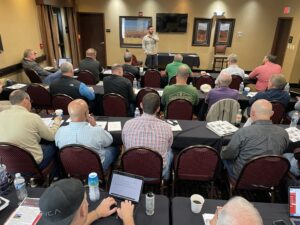
Today’s From the States features items from:
Baptist Beacon (Michigan)
California Southern Baptist
The Christian Index (Georgia)
Chronological Bible storying
used in Mich., overseas
By Grace Thornton
STERLING HEIGHTS, Mich. (Baptist Beacon) — Ellen Villalpando didn’t have a plan for exactly where or when she would use the technique. Michigan? Africa? Could be either. Or anywhere.
But she did know one thing — it was important.
“I was just leaving my heart open for the Lord to show me,” Villalpando said of the four-day Bible Storying Workshop sponsored by the Blue Water Association Women’s Missions and Ministry in partnership with Woman’s Missionary Union of Michigan.
The workshop, taught by retired International Mission Board representative Annette Hall in May, equipped nine Michigan Baptists to tell 21 Bible stories leading from Creation to the house churches of Acts.
“The stories take someone who’s never heard anything about Jesus all the way to the point of understanding how to have house group churches,” Hall said.
It’s a strategy Villalpando, a member of Memorial Baptist Church in Sterling Heights, has wanted to learn for some time.
“I’ve been to Niger three times, and I know how well it works. They listen and soak in the story,” she said.
Villalpando knew that she could use it as a preschool teacher, with the college ministry group she leads and when she goes on her next trip to Niger.
And she’s already spent three days teaching it to a group of teenage girls, who reproduced the stories quickly.
“The goal is to be able to teach the stories so that the people who are hearing them can tell someone else,” Villalpando said. “To be able to learn it and teach it to some young mission-minded girls was awesome.”
Hall said that’s exactly the idea behind the method. Seventy percent of the world’s population are oral communicators, she said.
And while people often associate storying with overseas work, as it’s proven highly effective in illiterate cultures, the United States has much more of an oral culture than people realize, she said.
“Some just don’t like to read or don’t want to read. Many people have come out of school and never picked up a book again. But everyone likes to talk and tell stories,” Hall said.
Because of that, she’s convinced that this is something Christians should be using “all over Michigan and the United States.”
People can use the story set developed by Hall and others, or they can develop their own story set tailored to the people they are trying to reach, Hall said.
It’s worth the effort to prepare, she said, whether it be for a mission trip or for a house group.
“People really get into the story, they talk about the story, they learn the story and how to apply it to their lives,” Hall said. “When I’ve used the stories, people I’ve never heard open their mouths in a small group were talking about the story.”
Instead of being told the meaning of the story, they listen and discover it for themselves, she said.
It’s a method that is effective for any age group, said Steve Evans, a specialist in oral communication who has also helped to develop chronological Bible storying curriculum for the International Mission Board and other organizations.
“Chronological Bible storying in evangelism, Sunday School, home and student Bible studies is proving very effective,” he said. “When God’s Word is presented chronologically, people begin to see the movement of God in history, and the pieces fall together and make sense for them.”
And from a teacher’s perspective, it’s a method that’s fun, enjoyable and memorable, he said.
Stories “are easy to learn and easy to reproduce,” Evans said. “This isn’t about head knowledge — it’s about the language of the heart. Stories speak from the heart, and they speak to the heart.”
It’s effective in the States, and it’s also highly effective overseas, he said.
Using storying “is not an issue of literacy only, even in developing nations. It is an issue of communication preferences, decision-making processes and how information is structured and presented,” Evans said.
Add to that the fact that out of the more than 6,000 languages in the world, only about 450 have the whole Bible in their language, he said.
“How will those peoples get God’s Word in ways they can hear it, understand it and pass it on? And even if they did have the written Bible in their languages,” Evans asked, “given the statistics on oral communication, could it be effectively utilized?”
As church planting movements are studied around the world, one of the key elements for sustainability is the presence of God’s Word, he said. And an effective way that it is spread is through chronological Bible storying, he added.
To access story sets used at the workshop, visit oralitystrategies.org and click on “strategies.”
–30–
This article appeared in the Baptist Beacon (baptistbeacon.net), newsjournal of the Baptist State Convention of Michigan. Grace Thornton is an assistant editor for The Alabama Baptist newspaper and a writer for the Baptist Beacon of Michigan.
**********
San Diego church start
helped by Calif. mission offering
By Amanda Phifer
SAN DIEGO (California Southern Baptist) — At four years old, Elevate Church in San Diego is registering on the radar even in a subculture where the concept of a Christian church rarely makes a “blip.”
As a native of the Bible Belt – South Carolina – Kevin Campbell is in a unique position to recognize this particularity of Southern California culture. And as the pioneer of Elevate Church in San Diego, he is especially thrilled that his church plant is reaching exactly that unchurched culture.
“In the South there’s a church culture,” Campbell explained. “In Georgia or South Carolina, your kids don’t get invited to birthday parties on Sunday morning, or to anything else, for that matter, even if the person doesn’t even go to church, because that time frame is just assumed to be set aside. Here, the church isn’t even on the radar as a potential activity for Sunday morning.”
But for the people who regularly attend Elevate, church is now part of their regular plan.
Campbell, a former college basketball player, was raised Catholic in Anderson, SC, but accepted Christ at age 19 and was baptized at Siloam Baptist Church in the small town of Powdersville, SC. On a college mission trip, he responded to the call to ministry, but never saw himself planting a church on the West Coast.
And yet three members of Elevate personify to Campbell the reason he and his wife, Susan, transplanted themselves and their children out of Georgia and into one of the least reached metropolitan areas in the country.
“Sean, in his mid-20s, grew up here,” Campbell began. “Sean’s dad is an atheist, and his mom would claim belief in God but is not a Christian. Sean lived here all his life and not one time stepped foot in a church until he came to Elevate. He attended a few months, even joining a life group. We loved him, prayed for him, answered questions, and knew it wouldn’t be long.
“One Sunday, when my pastor from (Georgia) was in town, Sean gave his life to Christ, with tears in his eyes, and a few weeks later we baptized him in the Pacific Ocean. Now he’s serving on a ministry team, spending daily time in God’s Word, is in a life group, and plays on my basketball team in our league, helping me share Christ with the guys on our team who are not yet believers.”
Note the progression of that journey: months of attending not just corporate worship, but also the intimate setting of a small group and the friendship-building setting of a sports team, and then a period of questioning, all prior to a decision to follow Christ. Campbell is firm that that kind of journey is intentionally encouraged.
“We wanted Elevate to be a place for people to belong even before they believe, a safe place to explore the Christian faith,” he explained. “Less than 6 percent of the people here are evangelical Christians; 85 percent are not affiliated with any kind of faith at all. That’s why we came here. We want them to have a chance to see just how relevant Jesus and His church are. We want Elevate Church to be truly life-giving in the way Jesus intended for His church to be.”
Steve and Inez have attended Elevate for about 18 months, in which time Steve made a profession of faith, Inez rededicated her life to Christ, and both were baptized last November.
“Here’s what they said on that day (they were baptized),” Campbell related. “‘We’ve been attending Elevate for a year, and our lives have never changed more dramatically than in the past year. We are two completely different people – better people – because of our time here.'”
While Sean, Steve and Inez represent high points, Campbell conceded church planting isn’t an easy road to walk.
“You’re starting from scratch, with nothing, and it takes so much momentum, so much pushing and praying just to get things off the ground and going,” he explained. “You say, ‘I know God can do this, but all I’m seeing is glimpses.'”
That, he said, is why it was “so critical” to have the support – financial and personal – that came from California Southern Baptist Convention, via the California Mission Offering. The influence, equipping and encouragement of the late Dan Cookson, in particular, who was at the time the CSBC church planting strategist for San Diego, was especially keen.
“We were absolutely sustained by that support during those early tough years. The biggest challenge was financially having what we needed to survive, even to live, much less to thrive and start a new church. The living expenses here are three times higher than in Georgia. We would not be where we are today if not for the support of the CMO and the Cooperative Program.”
Funds from CMO provided income and expenses for the Campbells, but also for expenses associated with planting a new church: care packages for local businesses, water distribution near local beaches, and barbeque block parties and free sports camps at local parks.
The Campbells also held three barbeques at their home, inviting people they’d begun building friendships with, and sharing a five-minute vision of their plans and desires for Elevate Church. They then gave these new acquaintances an opportunity to respond with a pledge to either help, or to attend the Jan. 11, 2009 launch service.
“We rarely had someone give us a cold answer,” Campbell said. “It’s almost always something like, ‘That’s cool, that’s a neat thing you’re doing over there, for you. I’ll be here doing my thing.'”
His assessment of some of the thinking behind such a response is that the people of San Diego are pursuing the American Dream “on steroids.”
“It’s so much more heightened here than I saw in the South. People want everything picture-perfect – the car, the house, the marriage, the children. And it means it’s harder to get beneath the surface in relationships, even though, ironically, deep down, people are craving authenticity, without knowing that’s what they really desire.”
In fact, one of the most common positive bits of feedback about Elevate is “how real it is, that that’s refreshing and makes (them) come back,” Campbell said.
“That’s just it: when we shine a light – even on our own imperfections and struggles – that light falls on everyone around us.”
Sounds like an authentic way to plant a new church.
–30–
This article appeared in the California Southern Baptist (csbc.com/csb), newsjournal of the California Southern Baptist Convention. Amanda Phifer is a writer for the California Southern Baptist.
**********
Ga. youth minister
in California
By Joe Westbury
PLACERVILLE, Calif. (The Christian Index) — It only took one stroll through the exhibit hall of a Georgia Baptist Convention annual meeting to bring two pastors together in an relationship that strengthened both of their ministries.
Neither Phillip Cochran nor Mark Standridge had ever met while they served in the state. At the time – November 2010 – Cochran was youth pastor at First Baptist Church of Blackshear and Standridge was serving as pastor of Bowdon Baptist Church.
Eventually Standridge accepted a call to a small church in northern California, about an hour east of the state capital of Sacramento. That move brought the two ministers together across a 2,200-mile expanse.
“I was already familiar with the partnership that Georgia Baptists were enjoying with the California state convention, so I decided I would ask for assistance to help us expand the ministry of my new congregation,” Standridge explained.
“Placer Heights Baptist Church had been through a rough time and needed some time to heal. I felt Georgia Baptists would be the best ones to aid in that process.”
Standridge’s new congregation, which he joined in 2010, averages about 85 in Sunday worship. It is located in an historic gold mining town with a fair amount of summer tourism not far from South Lake Tahoe … and was in a state the Austell native had never visited.
Standridge and his wife, Debbie, accepted the call and left a son and daughter, both college students, behind and brought their remaining teenage son along on the new ministry venture.
The former Georgia pastor, who had served churches in Colorado and Texas, filled out the paperwork with the office overseeing partnership missions and waited. That’s when, on that November afternoon, Cochran visited the booth and learned about Standridge’s request for assistance.
“First Blackshear was looking for a summer missions experience for our youth and after talking to Mark, I felt the Lord was leading us to his congregation,” Cochran says.
That’s when the two began to talk via telephone and explore the ministry needs and how each could benefit. It was an answer to prayer for the California congregation.
“I saw a lot of value in it for our young people,” Standridge says.
“We were just building our youth ministry and integrating it with Georgia youth seemed a very positive thing to do. It would expand their horizon to have these young people come all the way across the nation to spend time with them in ministry as well as recreation.
“Many of them had never had Christian role models before, either as parents or peers. Some were from broken homes and didn’t know what a Christian home life looked like. I just sensed God was in this from the beginning.”
That first year of 2011 the Blackshear team helped with two block parties that paved the way for outreach in coming summers. Eventually they provided meals to homeless in the community. Along the way the Georgia teens developed relationships with the Placer Heights youth which some maintain through email and Facebook contacts.
Making inroads of acceptance into the Placerville community has been slow but gained traction due to the presence of the Blackshear youth as well as adults from Carrollton Baptist Association who have begun leading summer Vacation Bible Schools.
“We share a property line with an apartment complex, but at some point the manager locked the gate between our two properties. While that may have given residents more security from strangers wandering onto their property, it made it very difficult for any residents to come to church.
“It took me an entire year to build a relationship and trust factor with the manager, but once he saw our interest in providing services to the community, he unlocked the gate. He now sees us as a partner, allowing us to hold block parties on his property and providing VBS for children on our property.”
But the trust has gone even further, he says. An attractive new playground at the church has become an even stronger drawing card for residents of the complex, so the manager is building a sidewalk to the church property line to make it easier for children to play at the facility.
Having youth from Georgia to staff block parties and adults to lead VBS has been instrumental in those new relationships, Standridge says.
Breanna Popham is a Blackshear youth who has come each year to Placerville since the church began the ministry two years ago. This past July was her third trip to California and she plans many more to come.
“Ministering here is so different that what we’re used to down South in the Bible Belt. We really have more chances to talk to people who don’t know Christ, though that is growing back home.
“The people here are very open to talking and our accents help break the ice,” she says with a laugh. “It really is a spiritually enriching experience.”
Courtney Howard returned to Placer Heights church for her second time this summer because of the good experience from last year. “We (Blackshear youth) become very close on a trip like this and get to know each other a lot better. We become prayer partners that continue long after we return home.
For Mary Courtney Puryear, the trip to northern California was her first ever mission trip.
“I’m becoming more confident in sharing my faith and appreciate the opportunities trips like this afford me. I want to use these kind of trips to grow closer in my walk with Christ.”
That’s what the trips are all about for chaperones like Jeanne Crawford.
“I feel it is important for our youth to experience a different culture from one they have grown up in, and these trips provide that experience. It gets them out of their comfort zone to knock on doors and talk to strangers with other about their faith.
“After being here for a week they build their faith and develop spiritual muscles which they bring back and use at home. They also develop leadership skills that they use to mentor those who come behind them.
Crawford believes such trips are important “and I want our youth to have as many different experiences as possible in their city, state, and world. I want them to be comfortable with being bold in their faith in whatever conditions they find themselves.”
–30–
This article appeared in The Christian Index (christianindex.org), newsjournal of the Georgia Baptist Convention. Joe Westbury is managing editor of the Christian Index.
**********
EDITOR’S NOTE: From the States, published each Tuesday by Baptist Press, relays news and feature stories from state Baptist papers and other publications on initiatives by Baptist churches, associations and state conventions in evangelism, church planting and Great Commission outreach, including partnership missions. Reports about churches, associations and state conventions responding to the International Mission Board’s call to embrace the world’s 3,800 unengaged, unreached people groups also are included in From the States, along with reports about church, associational and state convention initiatives in conjunction with the North American Mission Board’s call to Southern Baptist churches to broaden their efforts in starting new churches and satellite campuses. The items appear in Baptist Press as originally published.















